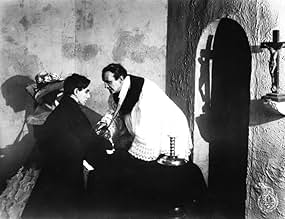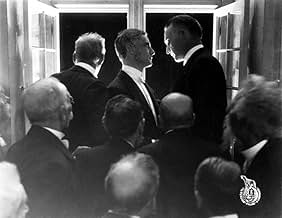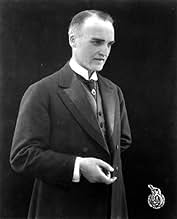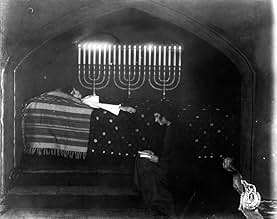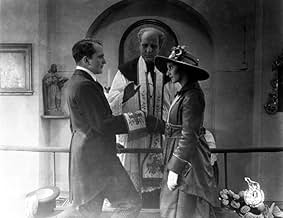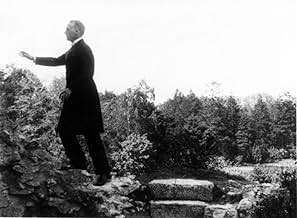Præsidenten
- 1919
- 1h 25min
VALUTAZIONE IMDb
6,6/10
1131
LA TUA VALUTAZIONE
Aggiungi una trama nella tua linguaA judge sees his illegitimate daughter facing a trial for the murder of her newborn child, also out of wedlock. He is certain that she will be sentenced to death.A judge sees his illegitimate daughter facing a trial for the murder of her newborn child, also out of wedlock. He is certain that she will be sentenced to death.A judge sees his illegitimate daughter facing a trial for the murder of her newborn child, also out of wedlock. He is certain that she will be sentenced to death.
- Regia
- Sceneggiatura
- Star
Carl Walther Meyer
- Rigsherre von Sendlingen
- (as Carl Meyer)
Recensioni in evidenza
"The President", known as Carl Theodor Dreyer's first feature-length film, includes a trial scene, solved in a traditional way, a strong contrast with his famous masterpiece "Passion of Jeanne d'Arc". In general, the "mise-en-caméra" is rather conventional, except for a couple of shots, both related to romantic situations in which the filmmaker was "inspired": one is a overhead shot of a kiss, the other two lovers' reunion on a bridge reflected on a pond. There are a few silly distracting shots dealing with puppies; one or two inserts seemingly erroneous, but in any case, it is an enjoyable viewing, and Dreyer's ethical considerations and spiritual leaning –which reached a sublime level in "Ordet"- are already sketched here.
"Praesidenten" is the first film of the great Danish film director Carl Theodor Dreyer and, for this German count, this debut is a perfect example of Dreyer's film style. It's one, with degrees of variation, he would maintain in his silent films as well as in his talkie career.
"Praesidenten" is a film perfectly constructed (the film is divided into three different but interrelated parts). Flashbacks are used to depict the terrible story of Danish noblemen who dare to fall in love with common girls; such huge mistakes will have serious consequences for the main characters as Herr Von Sendlingen says to his son at the beginning of the film, "never marry a commoner, for no good ever comes of it, naught but curses and remorse " ah, wise words, indeed!.
"Praesidenten", besides having a solid and narrative film structure very well rendered, has an elegantly slow pace, this is very characteristic in Herr Dreyer's films, film cadences and pauses endow the story with intensity and emotive nature, showing the vicissitudes of three generations of a family broken due to impossible or imprudent relationships. When at the end of the film the main character has the opportunity to atone his sins and make amends with the past, he finally carries the burden of stricter convictions and codes of honor.
"Praesidenten" is a solid debut, one with graceful and delicate pacing a perfect example of the Herr Dreyer oeuvre.
And now, if you'll allow me, I must temporarily take my leave because this German Count, as President of the "Associated Aristocrats Foundation" must attend another decadent meeting.
Herr Graf Ferdinand Von Galitzien
"Praesidenten" is a film perfectly constructed (the film is divided into three different but interrelated parts). Flashbacks are used to depict the terrible story of Danish noblemen who dare to fall in love with common girls; such huge mistakes will have serious consequences for the main characters as Herr Von Sendlingen says to his son at the beginning of the film, "never marry a commoner, for no good ever comes of it, naught but curses and remorse " ah, wise words, indeed!.
"Praesidenten", besides having a solid and narrative film structure very well rendered, has an elegantly slow pace, this is very characteristic in Herr Dreyer's films, film cadences and pauses endow the story with intensity and emotive nature, showing the vicissitudes of three generations of a family broken due to impossible or imprudent relationships. When at the end of the film the main character has the opportunity to atone his sins and make amends with the past, he finally carries the burden of stricter convictions and codes of honor.
"Praesidenten" is a solid debut, one with graceful and delicate pacing a perfect example of the Herr Dreyer oeuvre.
And now, if you'll allow me, I must temporarily take my leave because this German Count, as President of the "Associated Aristocrats Foundation" must attend another decadent meeting.
Herr Graf Ferdinand Von Galitzien
This film by Carl Dreyer is titled 'The President' in the old-fashioned European sense of the word 'president': the title character is the presiding official of a European town; not quite the mayor, nor quite the chief magistrate. Like its title, this entire film is very much a product of the fading days of imperial Europe. The film's premise takes it for granted that aristocratic noblemen are somehow innately different from the common folk, with a different set of priorities, a different set of duties, and a different form of justice.
The film is set in 19th-century Denmark. The main plot is some hoo-ha about a greying blue-blood (Halvard Hoff) who must preside over the trial and sentence of a young governess (Olga Raphael-Linden) accused of murdering the child in her charge. The governess pleads guilty, but for some reason she's going to be put on trial anyway. (I know nothing about 19th-century Danish law; would a defendant who pleads guilty to a capital offence be made to stand trial?) The president abruptly learns that the governess is his own daughter, born of a tryst with a working-class woman whom he didn't marry due to their social disparity. Naturally, because this total stranger is his own daughter he must now intercede. What follows is mostly deepest bathos.
The action of this sprawling movie takes place over three generations. Two of the actors in this film (Hoff and Elith Pio) each play their characters at two radically different ages; unfortunately, the old-age makeup on these two young actors is very unconvincing. Also unconvincing is the hairpiece worn by Richard Christensen (the best actor in this film) as the governess's defence advocate. I was distressed that Christensen bears a striking resemblance to Michael Palin. Talking of makeup: the governess wears lip rouge in her death cell.
Whoever handled the set dressing on this movie should have cut down on the caffeine: one character's home is decorated with dozens of silhouette portraits, while another character's home is festooned with miniatures arranged in geometric patterns. The keys for the cells in the local prison are hung on a wall-rack shaped like a bat; it looks like it would have been more appropriate in Dreyer's film 'Vampyr'. One shot in this movie, depicting a servant seen only in shadow, reminded me of a famous shot in 'Vampyr'.
In all the long length of 'The President', Dreyer's camera hardly ever moves and always does so clumsily. Fortunately, Dreyer's static camera gives us some strikingly beautiful compositions. All of his exteriors are exquisitely framed and lighted. (I wonder if he used reflectors.) A few brief sequences are rather obviously shot day-for-night. I was impressed by one shot when lovers meet on a bridge; we see their reflections in the water rather than the lovers themselves.
There are a few weird lapses here. One character wears spectacles in medium-long shot, then Dreyer cuts to him in close-up and the spectacles are gone. The president's cook carries live terriers in a closed satchel with no airholes, to no ill effect. The cook is played by Fanny Petersen, who strongly resembles Beryl Mercer, one of the most annoying actresses in film history.
'The President' has many flaws, most notably a turgid and overly complicated storyline. However, Dreyer's directorial skill is manifest here, and most of his actors give good performances. I'll rate this deeply old-fashioned movie 6 out of 10.
The film is set in 19th-century Denmark. The main plot is some hoo-ha about a greying blue-blood (Halvard Hoff) who must preside over the trial and sentence of a young governess (Olga Raphael-Linden) accused of murdering the child in her charge. The governess pleads guilty, but for some reason she's going to be put on trial anyway. (I know nothing about 19th-century Danish law; would a defendant who pleads guilty to a capital offence be made to stand trial?) The president abruptly learns that the governess is his own daughter, born of a tryst with a working-class woman whom he didn't marry due to their social disparity. Naturally, because this total stranger is his own daughter he must now intercede. What follows is mostly deepest bathos.
The action of this sprawling movie takes place over three generations. Two of the actors in this film (Hoff and Elith Pio) each play their characters at two radically different ages; unfortunately, the old-age makeup on these two young actors is very unconvincing. Also unconvincing is the hairpiece worn by Richard Christensen (the best actor in this film) as the governess's defence advocate. I was distressed that Christensen bears a striking resemblance to Michael Palin. Talking of makeup: the governess wears lip rouge in her death cell.
Whoever handled the set dressing on this movie should have cut down on the caffeine: one character's home is decorated with dozens of silhouette portraits, while another character's home is festooned with miniatures arranged in geometric patterns. The keys for the cells in the local prison are hung on a wall-rack shaped like a bat; it looks like it would have been more appropriate in Dreyer's film 'Vampyr'. One shot in this movie, depicting a servant seen only in shadow, reminded me of a famous shot in 'Vampyr'.
In all the long length of 'The President', Dreyer's camera hardly ever moves and always does so clumsily. Fortunately, Dreyer's static camera gives us some strikingly beautiful compositions. All of his exteriors are exquisitely framed and lighted. (I wonder if he used reflectors.) A few brief sequences are rather obviously shot day-for-night. I was impressed by one shot when lovers meet on a bridge; we see their reflections in the water rather than the lovers themselves.
There are a few weird lapses here. One character wears spectacles in medium-long shot, then Dreyer cuts to him in close-up and the spectacles are gone. The president's cook carries live terriers in a closed satchel with no airholes, to no ill effect. The cook is played by Fanny Petersen, who strongly resembles Beryl Mercer, one of the most annoying actresses in film history.
'The President' has many flaws, most notably a turgid and overly complicated storyline. However, Dreyer's directorial skill is manifest here, and most of his actors give good performances. I'll rate this deeply old-fashioned movie 6 out of 10.
It did seem to be a good film but i had trouble reading quite a few of the captions. The writing was too small and because of this it was hard to follow the storyline.
Dreyer is one of my favorite directors and his debut is one of the best debuts I've seen. The story is captivating, sometimes pretty brutal. Genuine tear-jerker.
Nice camera work, great musical score. A must-watch for fans of silent movies.
Nice camera work, great musical score. A must-watch for fans of silent movies.
Lo sapevi?
I più visti
Accedi per valutare e creare un elenco di titoli salvati per ottenere consigli personalizzati
Dettagli
- Tempo di esecuzione
- 1h 25min(85 min)
- Mix di suoni
- Proporzioni
- 1.33 : 1
Contribuisci a questa pagina
Suggerisci una modifica o aggiungi i contenuti mancanti

